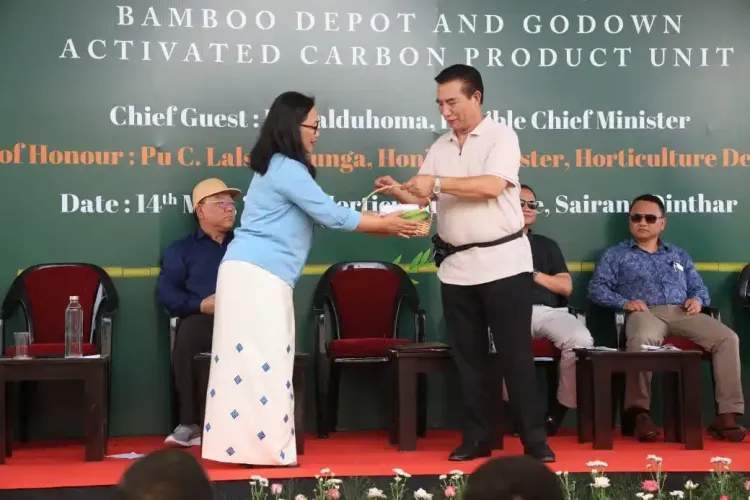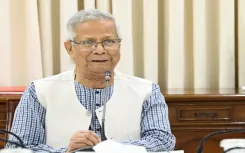Can Bamboo Transform Mizoram's Economy and Create Jobs?

Synopsis
Key Takeaways
- Bamboo is a valuable resource for Mizoram's economy.
- Processing units create numerous job opportunities.
- Bamboo charcoal production is more sustainable than wood charcoal.
- The National Bamboo Mission aims to enhance industrial activity.
- Proper management is essential for the long-term success of these facilities.
Aizawl, May 14 (NationPress) The Chief Minister of Mizoram, Lalduhoma, highlighted on Wednesday that bamboo is an invaluable asset for the state, one that can be harnessed effectively and sustainably, potentially becoming a significant catalyst for the local economy and generating numerous employment opportunities.
During the inauguration of essential bamboo processing facilities, the Chief Minister expressed his contentment with this initiative under the National Bamboo Mission, calling it a pivotal development in bamboo-centered industrial activities.
These bamboo processing facilities were set up with a financial investment of Rs 252.826 lakh at the Sairang Horticulture Centre as part of the National Bamboo Mission.
The facilities encompass a bamboo treatment and seasoning plant, a bamboo depot and storage, along with a unit for producing activated charcoal.
According to the Chief Minister, enhancing bamboo processing capabilities can significantly stimulate the local economy and create a considerable number of jobs.
He pointed out that charcoal is primarily derived from wood, which requires many years to regenerate post-harvest.
In contrast, bamboo can fully regrow in just one to two years. This rapid growth and resilience make bamboo charcoal production much more sustainable, as emphasized by Lalduhoma.
He asserted that bamboo charcoal production would contribute to forest preservation and environmental conservation. The Chief Minister also stressed the need for effective operation and maintenance of the processing facilities.
Lalduhoma encouraged the workforce to manage these new units with diligence and responsibility to ensure their enduring success.
Horticulture Minister C. Lalsawivunga noted that this signifies a new chapter in bamboo processing for Mizoram. He acknowledged the state’s rich bamboo resources and advocated for their sustainable utilization.
The Director of Horticulture and Missions Director of the State Bamboo Mission, C. H. Lalmuanpuia, remarked that the bamboo treatment and seasoning plant is essential for enhancing the utility and longevity of bamboo, with treated bamboo potentially lasting up to 50 years.
The bamboo depot and storage units are critical for distribution, while the activated charcoal unit aims to produce three tonnes of charcoal per day, targeting an annual output of around 900 tonnes.
Approximately 670 bamboo culms are necessary for daily operations. Additionally, the process will yield about 100 litres of vinegar each day as a byproduct, with up to 54 litres of refined vinegar obtainable through proper distillation.
Three bamboo clusters—Chhingchhip, Baktawng, and Saiphal villages—have already been established to supply bamboo to these processing units.
The North East Cane and Bamboo Development Council (NECBDC) is providing technical expertise for these initiatives and will conduct training programs to ensure effective management and implementation.
Mizoram, alongside Tripura and other northeastern states, is cultivating a variety of bamboo species abundantly, with approximately 28 percent of India’s bamboo forests situated in this northeastern region.










